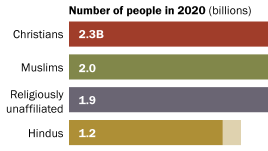
Many Religious ‘Nones’ Around the World Hold Spiritual Beliefs
Despite their nonreligious identity, many unaffiliated adults hold spiritual or religious beliefs. About a fifth or more in 22 countries believe in an afterlife, for example.
Numbers, Facts and Trends Shaping Your World
Despite their nonreligious identity, many unaffiliated adults hold spiritual or religious beliefs. About a fifth or more in 22 countries believe in an afterlife, for example.
All
Publications
Two years after Egyptians first poured into Cairo’s Tahrir Square chanting “Down with Mubarak” the legacy of the Arab Spring remains uncertain. Polling since the uprising shows that Egyptians want democratic rights and institutions, a major role for Islam in political life, and an improved economy – a challenging set of demands for the new cadre of Egyptian leaders.
Christians remain the largest religious group, and Muslims grew the fastest from 2010 to 2020. Read how the global share of Buddhists, Hindus, Jews and the religiously unaffiliated changed.
Most who use astrology (or a horoscope), tarot cards or a fortune teller say they do so just for fun rather than for insights about life.
After years of decline, the U.S. Christian share now shows signs of leveling off. The new Religious Landscape Study explores trends in identity, beliefs and practices.
The Global Religious Futures (GRF) project is jointly funded by The Pew Charitable Trusts and The John Templeton Foundation. Here are some big-picture findings from the GRF, together with context from other Pew Research Center studies.



